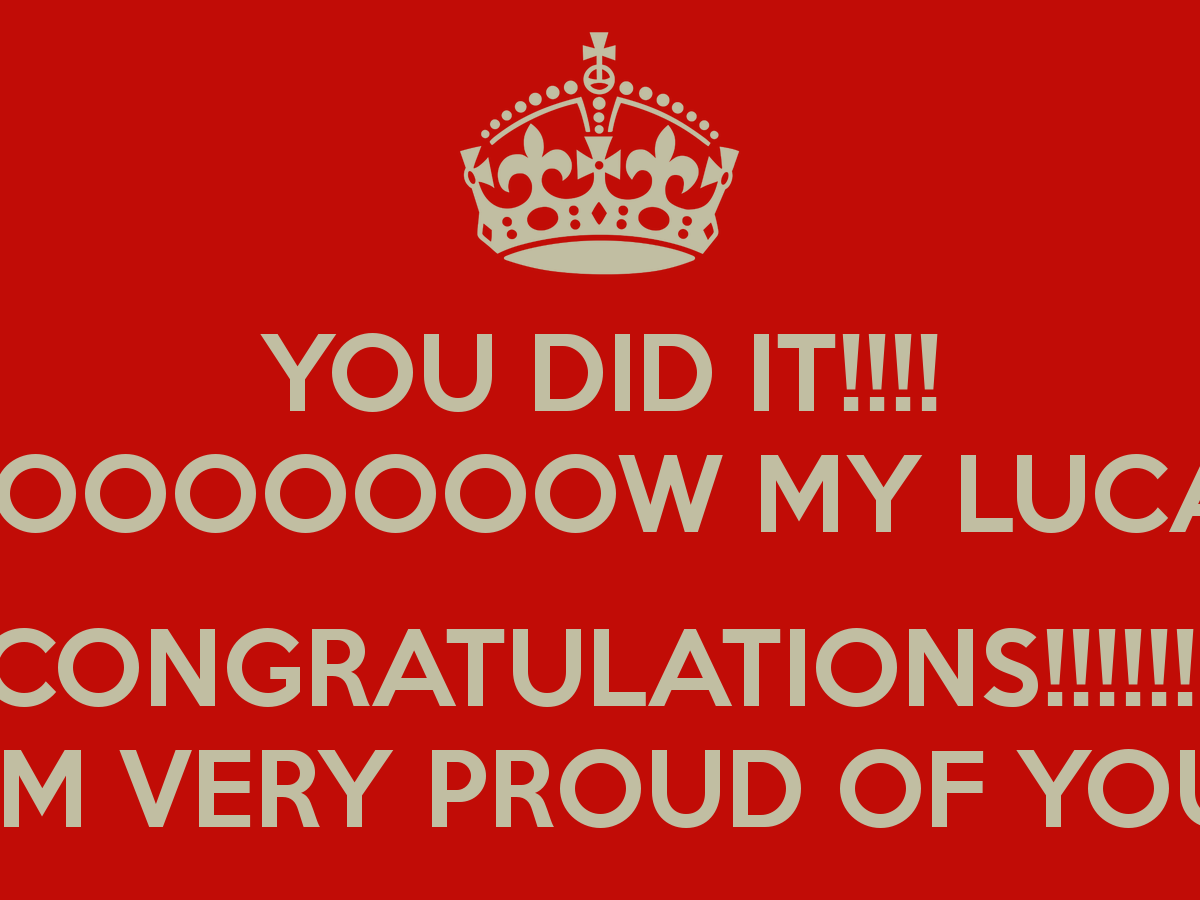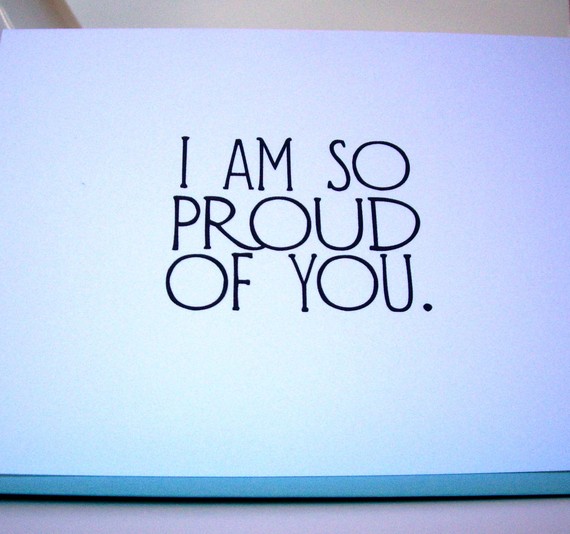Why Saying "I'm Proud Of You, Son" Matters More Than You Think
There’s something magical about those three simple words: “I’m proud of you, son.” They’re like a warm hug wrapped in sound waves, carrying with them a weight of emotion that can shape someone’s life forever. Whether it’s spoken by a parent, mentor, or even a friend, these words have the power to lift someone up when they need it most. But what makes them so impactful? And why do we often struggle to say them as much as we should? Let’s dive in and uncover the magic behind this powerful phrase.
Let’s be real here, life can feel like a rollercoaster sometimes. There are highs, lows, twists, and turns that leave us questioning our worth. That’s where phrases like “I’m proud of you, son” come into play. They act as anchors in the storm, reminding us that no matter how tough things get, there’s someone who believes in us. It’s not just about pride—it’s about connection, validation, and love.
And honestly, it doesn’t matter if you’re 5 years old or 50 years old. Those words still carry the same weight. They remind us that we’re valued, appreciated, and capable of greatness. So, if you’ve ever wondered why saying “I’m proud of you, son” is such a big deal, stick around because we’re about to break it all down for you.
Read also:How Old Is Cyrus Dobrev Unveiling The Age And Journey Of This Rising Star
Understanding the Power Behind "I'm Proud of You, Son"
Sometimes, the simplest things in life hold the deepest meanings. “I’m proud of you, son” isn’t just a phrase; it’s a declaration of support, trust, and admiration. It tells the listener, “You’ve done something amazing, and I see it.” But let’s get real for a second—why does hearing those words matter so much?
When someone says “I’m proud of you, son,” they’re acknowledging effort, growth, and resilience. It’s not about perfection or achieving some unattainable standard. Instead, it’s about recognizing the journey and celebrating the small victories along the way. And trust me, those little wins add up big time.
Why Emotional Validation Matters
Emotional validation is like fuel for the soul. Without it, people can start to feel invisible, unimportant, or unworthy. Saying “I’m proud of you, son” provides that validation in a way that nothing else can. It reinforces positive behavior, boosts confidence, and creates a sense of belonging.
- It shows that you notice their hard work.
- It builds self-esteem and encourages continued success.
- It strengthens relationships by fostering trust and mutual respect.
And let’s not forget—the person saying it benefits too! Expressing pride strengthens bonds and makes both parties feel good. It’s like a win-win situation, you know?
How "I'm Proud of You, Son" Shapes Identity
Identity is a funny thing. It’s shaped by so many factors, from personal experiences to external influences. But one thing that plays a huge role is the way others perceive and acknowledge us. When someone says “I’m proud of you, son,” they’re contributing to how that person sees themselves. It’s like planting a seed of confidence that grows over time.
This is especially true during formative years. Kids and teenagers are constantly searching for approval and acceptance. Hearing those words from a trusted figure can help them develop a strong sense of self-worth. And as they grow older, that foundation becomes even more important.
Read also:How Long Does Snapchat Hourglass Last Everything You Need To Know
The Long-Term Impact of Positive Reinforcement
Positive reinforcement has been studied for decades, and the results are clear—it works! People who receive consistent encouragement and praise tend to perform better, take on challenges with more confidence, and maintain healthier relationships. Saying “I’m proud of you, son” is one of the purest forms of positive reinforcement out there.
Think about it. If someone consistently hears that they’re valued and appreciated, they’re more likely to carry that belief into adulthood. It becomes part of their identity, shaping how they interact with the world around them.
Common Barriers to Saying "I'm Proud of You, Son"
Now, here’s the thing—not everyone finds it easy to express pride. Some folks might think it’s unnecessary or that their actions alone speak louder than words. Others might struggle with vulnerability, fearing that showing emotion will make them appear weak. But guess what? None of that is true.
Expressing pride isn’t a sign of weakness; it’s a sign of strength. It takes courage to open up and let someone know they matter to you. And honestly, the benefits far outweigh any perceived risks.
Overcoming the Fear of Vulnerability
If you’re hesitant to say “I’m proud of you, son,” ask yourself why. Is it because you’re worried about coming across as overly emotional? Or maybe you’re afraid of being misunderstood? Whatever the reason, remember that vulnerability is a powerful tool. It builds trust, deepens connections, and creates meaningful moments.
- Start small. Begin with casual compliments or acknowledgments.
- Be genuine. People can spot insincerity a mile away.
- Practice regularly. The more you express pride, the easier it becomes.
And hey, don’t worry if it feels awkward at first. Everything worth doing usually does!
When and How to Use "I'm Proud of You, Son" Effectively
Timing is everything when it comes to expressing pride. You want to make sure the moment feels authentic and meaningful. Here are a few scenarios where saying “I’m proud of you, son” can have the biggest impact:
- After completing a difficult task or project.
- When overcoming personal challenges or setbacks.
- During milestones, such as graduations, promotions, or achievements.
But remember, it’s not just about the timing—it’s about the delivery too. Make eye contact, use a warm tone of voice, and mean every word you say. That extra effort will make all the difference.
Adding Personal Touches to Your Message
While “I’m proud of you, son” is already powerful on its own, you can take it to the next level by adding personal touches. Mention specific actions or qualities that made you proud. For example, “I’m proud of you, son, for how hard you worked on that project. Your dedication really paid off!”
These small details show that you’re paying attention and genuinely care about their efforts. It’s like putting a spotlight on their strengths and reminding them of their potential.
The Science Behind Positive Affirmations
Let’s talk science for a minute because, well, who doesn’t love a good brain fact? Studies have shown that positive affirmations—like saying “I’m proud of you, son”—can actually rewire the brain. They activate areas associated with reward, motivation, and emotional regulation. In other words, hearing those words makes you feel good on a biological level.
But it doesn’t stop there. Regular exposure to positive affirmations can lead to long-term changes in mindset and behavior. People become more resilient, optimistic, and confident. It’s like giving someone a mental boost that keeps on giving.
Real-Life Examples of Positive Affirmations in Action
Take a look at successful athletes, entrepreneurs, or artists. Many of them credit their achievements to supportive figures who believed in them early on. Whether it was a coach saying “Great job!” or a parent whispering “I’m proud of you,” those words fueled their drive to succeed.
And it’s not just famous people who benefit from positive affirmations. Everyday individuals experience the same effects. So, whether you’re cheering on a family member or encouraging a colleague, those words can change lives.
Navigating Cultural Differences in Expressing Pride
Let’s not forget that cultural norms play a big role in how we express emotions. In some cultures, saying “I’m proud of you, son” might feel unnatural or even inappropriate. However, that doesn’t mean the sentiment isn’t there—it might just be expressed differently.
For example, some cultures value actions over words, showing pride through gestures, gifts, or shared experiences. Others might use indirect language or metaphors to convey the same message. The key is understanding and respecting these differences while still finding ways to express pride effectively.
Bridging Cultural Gaps Through Communication
If you’re unsure how to express pride in a way that resonates with someone else, try asking them directly. You could say, “I want you to know how proud I am of you. What’s the best way for me to show that?” This approach shows that you value their perspective and are willing to adapt.
And remember, there’s no one-size-fits-all solution. Every person and culture is unique, so flexibility is key. As long as your intentions are genuine, the message will come across loud and clear.
Dealing with Miscommunication and Misunderstandings
Miscommunication happens. Maybe the person didn’t hear you right, or maybe they interpreted your words differently than intended. Don’t panic—these situations can be fixed with a little patience and clarity.
If you sense confusion, clarify your message. Say something like, “I just wanted to let you know how proud I am of you. I truly believe in your abilities and what you’ve accomplished.” This reinforces your original statement while clearing up any misunderstandings.
Building Stronger Relationships Through Clear Communication
Clear communication is the foundation of any strong relationship. By taking the time to express pride clearly and sincerely, you’re showing that you care about the other person’s feelings and well-being. It’s a small act that can lead to big results.
So, whether you’re saying “I’m proud of you, son” or any other heartfelt phrase, remember that authenticity and intentionality are key. Your words have the power to inspire, motivate, and transform. Use them wisely.
Conclusion: The Lasting Impact of "I'm Proud of You, Son"
As we wrap things up, let’s take a moment to reflect on everything we’ve covered. Saying “I’m proud of you, son” isn’t just about expressing pride—it’s about building connections, fostering growth, and creating lasting memories. Those three little words have the power to change lives, one person at a time.
So, the next time you’re tempted to keep your feelings to yourself, remember this: sharing your pride can make all the difference. Whether it’s through words, actions, or gestures, let the people in your life know they matter. Because they do.
And hey, don’t forget to leave a comment below or share this article with someone who needs to hear it. Together, we can spread the love and positivity that the world needs so desperately. After all, we’re all in this together.
Table of Contents
- Understanding the Power Behind "I'm Proud of You, Son"
- How "I'm Proud of You, Son" Shapes Identity
- Common Barriers to Saying "I'm Proud of You, Son"
- When and How to Use "I'm Proud of You, Son" Effectively
- The Science Behind Positive Affirmations
- Navigating Cultural Differences in Expressing Pride
- Dealing with Miscommunication and Misunderstandings
- Conclusion: The Lasting Impact of "I'm Proud of You, Son"


